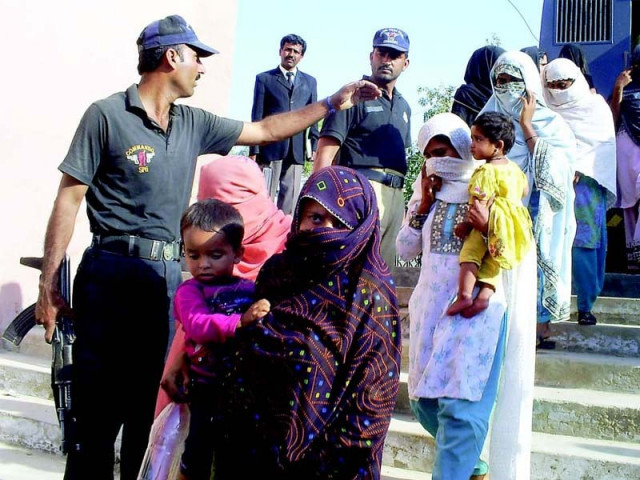Six LHWs suspended for negligence in Bhakkar
Commissioner says action taken in view of workers’ negligence during anti-dengue campaign

File photo of lady health workers. PHOTO: NAEEM GHOURI/EXPRESS
In Bhakkar district, 55 people have been diagnosed with the disease. These patients are the ones who returned from Rawalpindi and Islamabad to their homes in the district and were later diagnosed with the mosquito-borne disease. Reportedly, there is no local case of dengue virus found in Bhakkar at all.
Officers and employees of all the government departments of the district are in the field to end the virus and are putting all their efforts and energies to curb the disease. A total of 174 anti-dengue teams have been set up in 64 union councils in Menkara, Kalorakot and Darya Khan. These teams are checking dengue on a daily basis throughout the district.
The DC told The Express Tribune that around 500 legal notices have been issued by the health department across the district to ensure cleanliness and to prevent the possible spread of dengue virus at water pools, tyre shops, ice factories, tube wells, garbage boxes and bus terminals in different areas. The district administration has been fully mobilised to tackle the issue.
The dengue virus is nourished in the human body and spreads through bites of either the yellow fever mosquito or the Asian tiger mosquito.
After mosquito bites, the virus transmits through the insect after two to four days to a healthy person. These mosquitoes bite human beings between 8am and 5pm. To eliminate dengue, it is necessary to clean water bodies and spray doors on houses, offices, schools and shops. it is also essential to keep the doors closed for an hour, clearing water collection utensils like pots, drums, buckets, tubs and tanks.
It is necessary to always cover items of water collection and rinse items such as coolers regularly. When not in use, air conditioners should be drained regularly. Water should not be left stagnant anywhere indoor, on terrace or near plants. Water should not be allowed to accumulate in cages, towels, old utensils, and tyres.
Regular use of shopping bags and used bottles should be avoided to prevent dirt from accumulating in these items. Cages of birds and animals and water pots should be constantly cleaned and water from fountains, waterfalls and swimming pools should be drained. The district administration is also distributing pamphlets for awareness on dengue prevention.
Chief Executive Officer Health Dr Sheikh Mohammed Saeed said that special dengue wards have been set up at District Headquarters (DHQ) hospital where 18 beds have been provided, 5 beds have been provided at each Tehsil Headquarters (THQ) hospital, 4 beds at each Rural Health Centre (RHC) and 25 beds at six private hospitals in Bhakkar District.
These special dengue wards have been designed to provide all the medical facilities to the patients suffering from dengue, he added. “In Bhakkar district, all water ponds have been removed so that the dengue larvae cannot breed. Around 55 dengue cases in the district have registered of patients who travelled from Rawalpindi and Islamabad.”
More than 49 homes have been sprayed besides these patients to kill the dengue mosquito, he further said. “Dengue larvae have also been removed by pouring medicines into hundreds of water ponds.”
Darya Khan Assistant Commissioner Asad Chandio highlighted that all arrangements for the eradication of dengue were completed on the orders of the DC. “The awareness campaign has been launched in schools and colleges on a daily basis to hold seminars, walks and ceremonies for which results are being produced by the municipal committee staff regarding drainage in their areas, streets and neighbourhoods.”
Dengue is dangerous but it is certainly a preventable disease, he added. “One should not be afraid but to fight against it. In the current season, the risk of a dengue outbreak can be high, but taking precautionary measures can prevent the outbreak.”
Published in The Express Tribune, October 17th, 2019.



















COMMENTS
Comments are moderated and generally will be posted if they are on-topic and not abusive.
For more information, please see our Comments FAQ